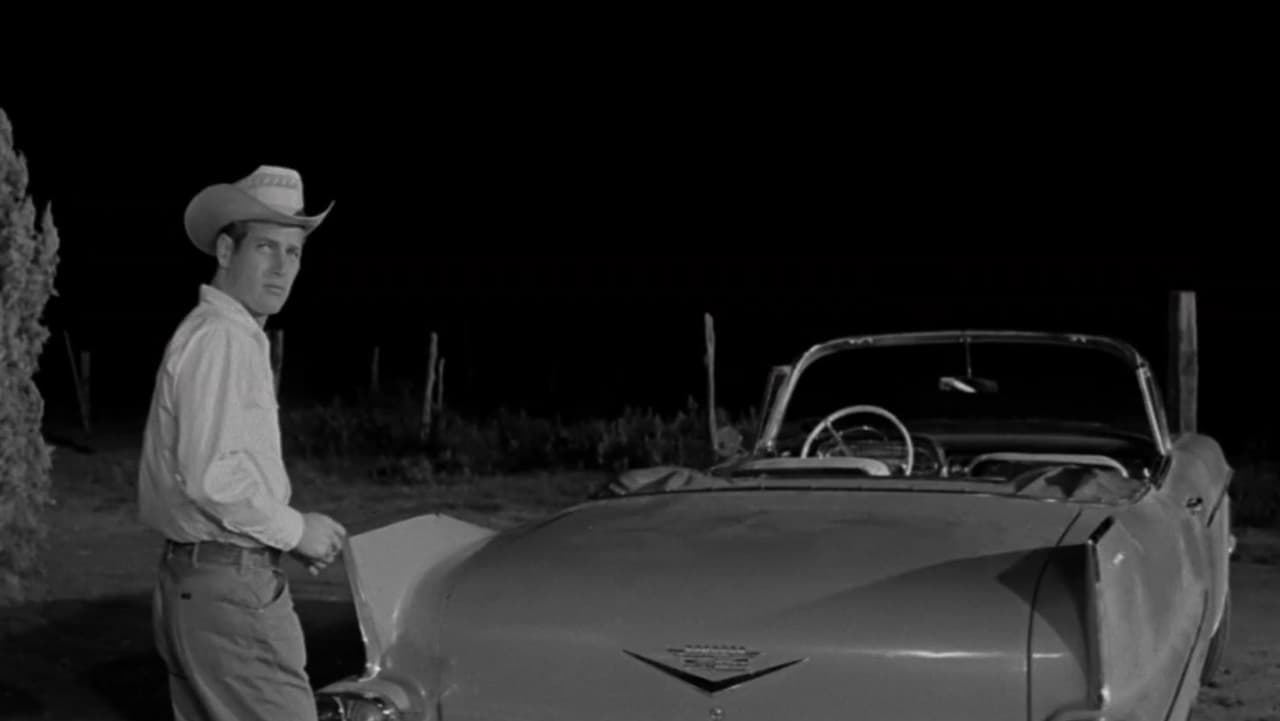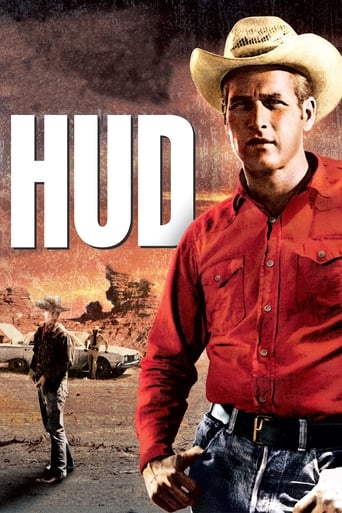

Excellent cinematography and performances cement 'Hud (1963)' as a well-made character piece. It has a good script, with rustically realistic dialogue compounding its sense of time and place as well as its sometimes difficult themes and situations, and it is entertaining enough to watch once but isn't really all that compelling. It's not like I was on the edge-of-my-seat but I cared enough about the characters to want to see what would happen and, indeed, to believe everything that did. The central character isn't exactly your typical 'leading man', either, and this departure allows Newman's acting chops to really come through. 6/10
... View MorePaul Newman's career had so many high points, whether it was in Tennessee Williams (CAT ON A HOT TIN ROOF; SWEET BIRD OF YOUTH), private eye films (HARPER), prison films (COOL HAND Luke), Westerns (HOMBRE; BUTCH CASSIDY AND THE SUNDANCE KID), period comedy (THE STING), or even disaster films (THE TOWERING INFERNO). But he was known for being an actor who took big chances with the supposed image he had in the press. The best example of this was with the 1963 contemporary Western HUD, where he played, for lack of a better word, a genuine bastard.Based on the Larry McMurtry novel "Horsemen Pass By", HUD puts Newman in the title role of a n'er-do-well Texas cattle baron's son who lacks the kind of scruples and morals that the father (Melvyn Douglas, in an Oscar-winning role) thought he had passed on to him. Newman had lost his brother in an auto accident a few years back, and since then he has become a fairly lecherous, often inebriated no-count. He is a very poor example to his nephew (Brandon DeWilde), and his father is increasingly fed up with him. And yet, he does not give a damn. He has his eyes on a prize.But that prize will be costly for Douglas. Pretty soon, he learns that his entire cattle herd has been infected with a dreadful case of hoof-and-mouth disease; and the only way to keep these cattle from going to market in the state they are in, and thus creating an epidemic all over the country, is to kill them all, something that will totally ruin the old man. Not that Newman cares, of course; he is thinking of the future there in Texas, and it's not cattle, it's oil. Newman also gets it on with the family housekeeper Alma (Patricia Neal, who also won an Oscar for her role, and was the wife of legendary children's novelist Roald Dahl). Neal tolerates this for the most part, but after Newman basically rapes her, she passes a Rubicon with him. The tragedies multiply, with the mass slaughter of the herd, Douglas' death, and the departures of both Neal and DeWilde. But Newman doesn't change.With a screenplay by Irvin Ravetch and Harriet Frank Jr., and excellent direction by Martin Ritt, HUD is a stark and genuinely personal look at the world of ranchers and farmers in a Texas that is quickly becoming modernized. The world that made it possible for men like Douglas to make something of themselves is being replaced by a society that makes guys like Newman the future, and not necessarily a good future. The genuine flatness of the Texas landscape and the starkness of the small Texas town where the film is set are rendered with incredible realism via the superb black-and-white cinematography of James Wong Howe, who won the film's third Oscar. Douglas and Neal are excellent in their roles, as is DeWilde, whose other memorable role was as the young boy in the classic 1953 western SHANE. Elmer Bernstein's minimalist, minor-key guitar score is punctuated by the various bits of country-and-western music coming out of radios and jukeboxes, giving the film an even greater reality and authenticity.But it is Newman himself who so brilliantly stands out. He plays someone who is thoroughly unsympathetic, a rake of the first order. Virtually nobody in this day and age would ever be able to play that kind of a role; and Hollywood wouldn't even bother to make such a film now. But HUD comes from the early 1960s, when Hollywood was becoming more attuned to the times instead of being stuck in the past, or too timid to be as close to real as possible. And Newman was a huge part of that. Had his good friend Sidney Poitier not been equally as good in LILLIES OF THE FIELD in that same year, Newman would have won that year's Best Actor Oscar (though I don't want to besmirch Poitier's exemplary career, or his Oscar-winning role in any way).Still, HUD is a great, if rather depressing, film of a time that is, in a lot of ways, sadly a distant memory. It remains one of the most important films of its kind, and of its time.
... View MoreHomer Bannon is an honest, hard-working, by-the-book Texas rancher. His son, Hud, is quite the opposite - amoral, unscrupulous and tending to prefer chasing married women around, rather than working on the ranch. The two are in constant conflict. Stuck between the two are Lonnie, Hud's nephew, and Alma, the Bannon's live-in housekeeper. Lonnie is a naive, impressionable young man who simultaneously idolises Hud and despises some of the things he does. Alma is constantly positive, is happy to overlook Hud's antagonism and tries to stay out of the fights. What happened to Lonnie's father, Hud's brother, hangs over the family, but nobody dares speak about it. The feud between Hud and his father comes to a head when a possible epidemic strikes their cattle herd...Great character drama, driven by some fantastic performances. Plot is a bit of a slow-burner, though it is never dull. The interactions between the main characters drive the movie, and your engagement.Quite powerful ending.As mentioned, it is the performances that drive this. Three of the four main actors - Paul Newman (as Hud), Melvyn Douglas (Homer) and Patricia Neal (Alma) got Oscar nominations with Douglas and Neal picking up Oscars (for Best Supporting Actor and Actress, respectively). Paul Newman, who is superb in a rare bad guy role, missed out to Sydney Poitier in Lilies of the Field.Brandon De Wild, the only one of the four to not get an Oscar nomination, is great as Lonnie and is unrecognisable from the irritating kid who yelled "Shane! Shane!" all the time in Shane.How this movie didn't get nominated for the Best Picture Oscar in a year when the eventual winner was the mediocre Tom Jones, I don't know.
... View MoreAfter watching Melvyn, Paul, Brandon, Patricia and co. in a few films I could not for the life of me differentiate any new approach to character development. If this were a silent film I would be enthralled, the visuals are inspiring, poignant, and magnificent! However, the dialogue is non-stop slick, too cool for school, with good liking evil and evil spitting back.Film is unclear of thematic exposition. Having to trade off oil wells for dead cattle and two gorgeous longhorns? Hating a living child and revering a deceased one? Methods of entertainment in small Texas farming community? Hoof and Mouth disease is a conspiracy theory? Government officials are not to be trusted? Or, yet another vehicle to pronounce Newman sexiest man alive...again? Lest I sound ungrateful for this conundrum, it did educate somewhat of how to perceive films of this genre and the attempt to appreciate the unsung hero. Despite the prolonged ending, education was King for the moment and we all left the farm content.Recommend for Newman fans, de Wilde at 17 (gorgeous), Texas Longhorns and one fine seXy scene with Neal.
... View More